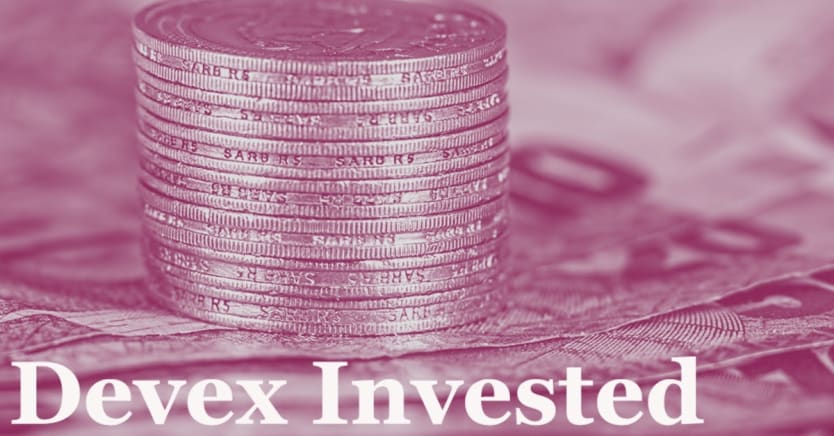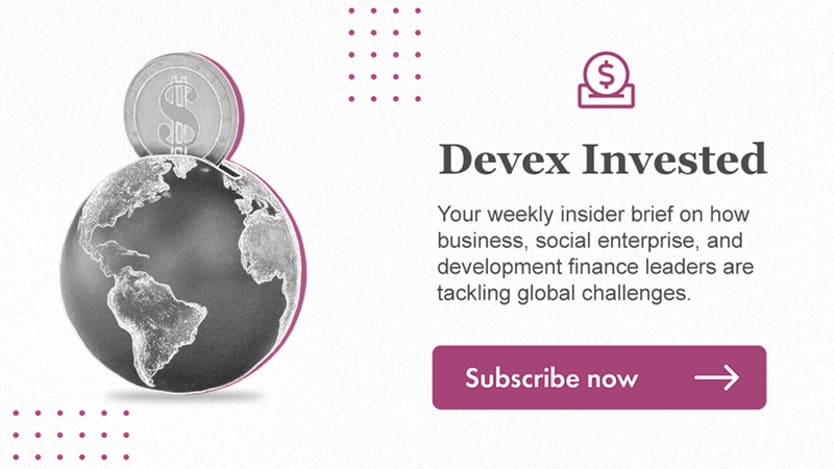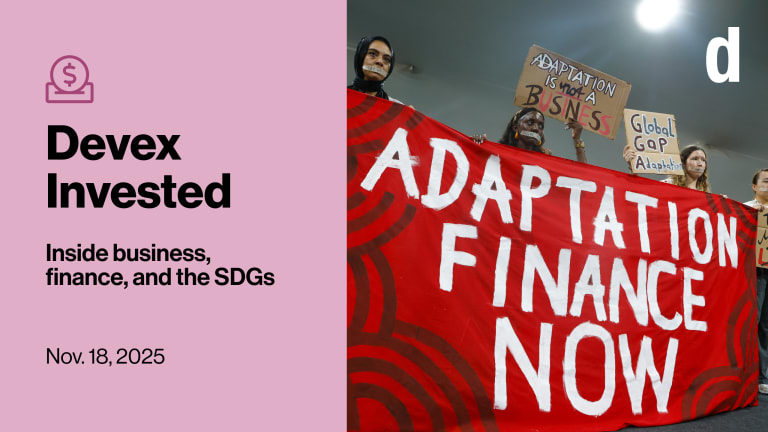
This is a preview of Devex Invested
Sign up to this weekly newsletter inside business, finance, and the SDGs, in your inbox every Tuesday.
There’s a growing discussion on how to link climate action with COVID-19 recovery and rebuilding efforts.
One emerging proposal is debt-for-climate swaps — potentially reducing low-income countries’ mounting debt burdens while ensuring they invest in green development. Debt is sure to be part of the agenda when finance ministers and central bank governors from the G-20 group of nations meet this week. If they get behind this tool, it could gain momentum — and fast.
• Debt-for-climate swaps are a good idea in theory, but how they work in practice will depend on how they’re set up and what conditions are attached, Anca Gurzu reports for Devex.
• “Today, with increased debt levels, it’s not just that countries will keep exploiting fossil fuels to repay debt, but they have very little fiscal space to invest in climate mitigation, adaptation, and transformative models of their economies,” says Iolanda Fresnillo, senior policy and advocacy officer on debt justice at Eurodad.
• The International Monetary Fund and World Bank are expected to introduce a green debt swap instrument in the lead-up to the 2021 United Nations Climate Change Conference in November. When they do, they should be careful to ensure “that these schemes don’t have green conditionality, in the sense that northern countries don’t dictate what green means,” Kevin Gallagher, director of the Global Development Policy Center at Boston University, tells us.
Read: How to thread the needle on green debt swaps
The global corporate taxman cometh
A group of 130 countries has agreed to major global tax changes, including a tax for the world’s 100 biggest companies and a global minimum corporate tax of 15%. G-20 countries are expected to approve the deal this week.
Debt relief roadblock
74 of 141
—This is the number of governments that met minimum requirements of public fiscal transparency set by the U.S. State Department. The metric is designed to hold governments accountable.
Cautious optimism
It’s been a yearslong process, but the International Finance Corporation has a new accountability policy that has watchdog groups cautiously optimistic. The Office of the Compliance Advisor/Ombudsman, or CAO, now falls directly under IFC’s board of directors. The new mechanism is designed to be more transparent, nimbler, and easier to use.
Read: Activists cautiously optimistic about new IFC accountability policy
Rising tide
IDB Invest, the private sector arm of the Inter-American Development Bank, is testing the waters on blue bonds, a sustainable investment designed to save the world’s oceans and help the countries that rely on them. Shabtai speaks with IDB Invest CEO James P. Scriven.
Why blue bonds?
People are looking for other things than only financial returns. We realized that the way to really have a dent in the U.N. Sustainable Development Goals is connecting development assets to capital markets.
If it isn’t for the oceans, we would not survive. We are seeing that there is [an] appetite for these investments around the world.
What kinds of projects will blue bonds help support in the Latin America-Caribbean region?
While we do see that in the past this was not a big priority, there is a gradual and big shift in [the] Caribbean, supported by the IDB Group, for this to be a big focus.
In addition to the pandemic, the Caribbean is hard hit by hurricanes, it’s hard hit by nature. Adapting and preparing our physical infrastructure to be able to survive a Category 5 hurricane is part of the work we are doing. [Blue bonds can support] infrastructure, resilient infrastructure.
Your next job?
Director, Immunisation Financing and Sustainability
Gavi, the Vaccine Alliance
Switzerland
Investments of interest
• IFC — along with the German, French, and American development finance institutions — will provide €600 million ($713 million) to Aspen Pharmacare, a South African pharmaceutical company, to ramp up COVID-19 vaccine production on the African continent. DFIs tell us this is among the first major such deals.
• Gender lens investing is on the rise, with a number of new announcements tied to last week’s Generation Equality Forum. DFC said it would mobilize at least $12 billion by 2025 to invest in businesses that advance gender equity.
Our mistake
Last week, we implied that the European Bank for Reconstruction and Development was not yet investing in Africa. But it is, and we’ve even written about it. To clarify, the debate is about further expansion on the continent, particularly in sub-Saharan Africa.










